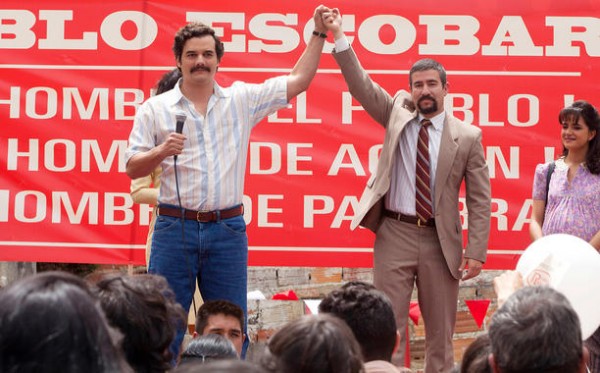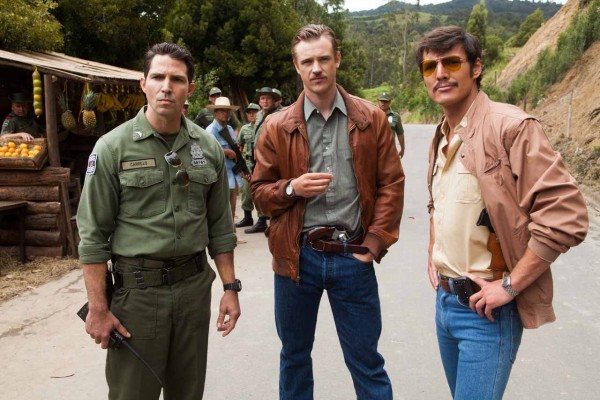
Courtesy of Netflix
Narcos gets political as Pablo (Wagner Moura) makes a successful congressional bid and becomes the target of a smear campaign just as quickly.
Let’s bitch it out…
If episode two worked because it reduced the narrative to a single historical moment, then ‘The Men of Always’ bears similar fruit by adopting the same approach. This is much more Pablo’s episode than anyone else’s and Moura continues to make the most of his depiction of the famed narcissist drug lord.
Episode three is basically “Pablo runs for office” and if it suffers from any issues, it is simply that it’s two main outcomes: his rise and subsequent fall, and the death of chief adversary Minister Lara (Adan Canto) are basically guaranteed as soon as the episode begins. The fact that the expected occurs is hardly a death sentence for a series like this, however, considering that everything is more or less a matter of public record because this actually happened approximately two and a half decades ago.
What’s strange is how the series – or at least episode three’s writers – seem less interested in the activities of the DEA than Pablo. He’s such a larger than life character, it’s no wonder that we’re spending more time with him, but after the first episode (which opened with the detailed breakdown of the substantial effort of the DEA to eavesdrop) the law has receded steadily into the background. There’s still some developments on their front – primarily when Peña (Pedro Pascal) and Murphy (Boyd Holbrook) meet with, and pay off, Suarez (Julián Beltrán) for intel that nearly leads to the arrest of Poison (Jorge A. Jiménez) had Suarez not been on both the Narcos and the DEA payrolls.
Still, Pablo is where it’s at. The episode focuses on his ascension as a political candidate early on as he works with reporter Valeria Valdes (Stephanie Sigman) to act on his political ambitions. Enter Mr. Duque (Bruno Bichir), a lawyer who – in exchange for a generous chunk of change, naturally – greases the wheels with Minister Lara to allow Pablo’s run as an alternate for the New Liberals.
Pablo’s speech is everything we’ve come to expect from the man. As a citizen in a country currently immersed in a political election, it’s not hard to spot the spin in Pablo’s “poor man” speech to the impoverished voters in his riding. If the placating words aren’t enough to ensure victory, Pablo’s men use money, handing out wads of cash (in broad daylight!) in exchange for votes.
The victory is so assured that Gacha (Luis Guzmán) and Ochoa (André Mattos) begin plotting what they’ll do once Pablo is elected. The DEA, meanwhile, plot ways to prove that Pablo is a criminal. Their initial approach, tracking down the mugshot from Pablo’s ’76 arrest, seems sound, but after a string of deaths of those involved in his arrest (guard, lawyer, judge) the DEA is forced to basically grab the photographer and his negatives, and spirit him away into protective custody. Expect this dangling plot thread to pop up against later.
Election day: 28 year old Pablo is elected by a landslide. In his head (in a visual display of magical realism), Pablo imagines himself walking up the steps of Congress, welcomed by his fellow officials. There’s a distinct sense of unreality in the early part of these scenes as Pablo sees himself in dress clothes and the visual design of his ascension evokes the chilly, distanced tone of fellow Netflix series House of Cards. It’s not even clear if Pablo is physically present or simply imagining it until Lara smears him with a giant blow-up of his mugshot during the opening speech. From there reality comes crashing down on Pablo’s dreams as the two begin to trade blows in public. Lara continues the offensive, so naturally he’s executed in short order. Guess he should’ve worn the flak jacket Murphy gave him! (Side Bar: anyone else surprised that there isn’t bullet proof glass in these cars?)

Courtesy of Netflix
Other Observations:
- Suarez’s lead identifies the Bogota airport employees as the instigators whose actions led to the death of Murphy’s cat. In the interrogation room, they come down hard on the two men and my notes only contain three words: SO.MUCH.SLAPPING. Between the payoffs and the slapping, we’re getting a strangely skewed idea of what law enforcement in Colombia looked like back in the 80s.
- Both of the episodes’ two significant action scenes occur in cars. First the DEA tries to intercept Poison at a road side stop only to have their efforts circumvented by Suarez at the last minute. Later Lara is shot and killed on his way to the airport as retribution for Pablo’s failed political career. Interestingly, Lara’s death brings to mind Pablo and Poison’s conversation about the confluence of politicians and gangsters. Lara tried to go up against Pablo like his enemies do and he was taken out like a gangster.
- Pablo knows his women: Tata (Paulina Gaitán) causes a fuss about Valeria (Stephanie Sigman) and Pablo talks her down. Valeria causes a fuss about getting her due for helping to get him elected and Pablo talks her down. Clearly he’s more than a modern day Robin Hood; he knows just what to say to keep his women under his thumb.
- Speaking of Valeria, in the opening scene, Pablo ties her up for nicknaming him Paisa Robin Hood in the press. He then pleasures her with a gun. Super, duper disturbing.
- In what will likely end up being an ongoing story line, Connie (Joanna Christie) begins to volunteer in the communa alongside Maria from last episode’s communist M-19 group.
- Carlos (Juan Riedinger) dispenses Hitler’s advice to burgeoning politicians to Pablo: no bathing suit pics. Well, maybe Hitler was right about one thing.
- After Lara outs Pablo as a criminal, Narcos offers a montage of drug lord crackdowns that occur in the aftermath, including Gacha losing his soccer team and Pablo being fined for illegally importing animals. Billionaire drug lords: they’re just like us!
- Finally, early in the episode Peña tells Murphy the tale of Kiki Camarena, a murdered DEA agent, whose death inspired a bloodbath of retirubtion that essentially ensures that no Narcos will ever accept the $350 grand bounty on a DEA agent’s head. If you want the whole story, you can check it out here. It’s as disturbingly true crime-y as you’d expect.
Best Lines:
- Airport employee Santiago (when his colleagues insists the Narcos will kill his wife if he talks): “He’s having problems with his wife.”
- Poison (after Pablo reassures his men they’re meeting with politicians, not gangsters): “Aren’t they the same things, boss?” Nyuk, nyuk, nyuk.
Your turn: what did you think of Pablo’s brief career as a politician? Were you at all surprised to see Minister Lara bite it? Are you enjoying the brief snippets of real photos and documentary footage intercut through key sequences? Is Holbrook’s Murphy growing on you? And where does the story go next? Sound off below, but please refrain from posting spoilers if you’ve watched ahead.
Narcos is now available in its entirety on Netflix. Check back Thursday for our review of episode four.